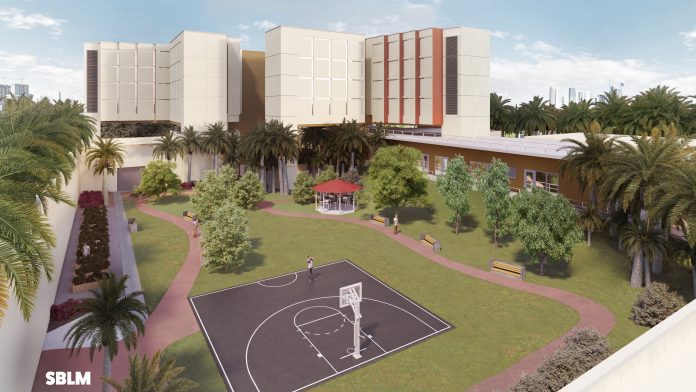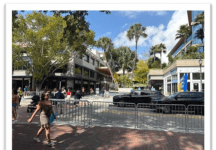|
Getting your Trinity Audio player ready...
|
After more than thirteen years in the making, the Miami Center for Mental Health and Recovery is projected to open its doors within the next six months.
The seven story,181,000 square-foot building is a former state mental health facility that is being completely renovated and updated into becoming the first of its kind mental health diversion facility in the United States.
The Miami Center for Mental Health and Recovery (Center) will provide a comprehensive system of medical and psychiatric care for individuals with serious mental illnesses and substance use disorder who frequently cycle through the most acute and expensive systems of care, including jails, hospitals, psychiatric facilities and homelessness without ever receiving the care they need. This facility will help break this cycle, according to the team of planners behind the new facility’s genesis.
“Recovery is both realistic and possible. In fact, the recovery rates for many people with mental illnesses and substance use disorders is often better than for those suffering from heart disease or diabetes,” explains Judge Steven Leifman of the Eleventh Judicial Circuit of Florida and the visionary behind the Center. Judge Leifman has seen the heartbreaking succession of people with mental illnesses come through his courtroom for decades again and again without ever receiving the care they need. As a result, he founded the Eleventh Judicial Circuit Criminal Mental Health Project (CMHP) in 2000 which ultimately led to the building of the Center.
“These are the people we step around when we see them on the street. We wouldn’t do that to someone who was having a heart attack, and yet they are having what we might consider a heart attack of the brain,” says Judge Leifman.
The Criminal Mental Health Project has resulted in the number of arrests in Miami-Dade County precipitously dropping from 118,000 per year to 53,000, the jail audit declining from 7,400 to 4,400 and the County closing one of its three main jails at cost savings to date of over $120 million dollars. In addition, police shootings and police injuries have also been significantly reduced.
While the CMHP has been enormously successful, there remains a small population of very ill individuals who can’t get the services they need in the existing system of care.
A small population in critical need of care
The statistics overwhelmingly demonstrate a pressing need for the Center. According to Judge Leifman, Florida ranks 43rd nationally in access to mental health care and, ironically, the Miami-Dade County Jail is the largest psychiatric institution in Florida. Miami-Dade County spends $848,000 a day, or more than $310 million dollars a year to warehouse approximately 3,200 inmates with mental illnesses in jail. That means that Miami-Dade County is spending about $100,000 annually in taxpayer dollars for each person with a mental illness in jail, compared to $1,400 for every individual who receives mental health care in the community by the State of Florida. Most of the individuals in the Miami-Dade County jail with mental illnesses are charged with low level, non-violent offenses.
Over time, the impact of failing to provide adequate community-based treatment is considerable. “We did some research and found that over a five year period, 97 individuals with serious mental illnesses who were identified as “heavy users” of acute care and institutional services accounted for 2,200 bookings in the Miami-Dade jail and spent 27,000 days in the Miami-Dade County jail,” explains Judge Leifman.
The study was recently updated and shows that since 1985, these same 97 individuals were arrested 4,210 times and spent 97,438 days in the Miami-Dade County Jail. Ninety two percent were homeless at the time of their arrest and their confinement cost taxpayers tens of millions of dollars without any positive outcomes. “It’s the definition of insanity where we keep doing the same thing and expect a different outcome,” says Judge Leifman.
The problems currently facing the mental health and, consequently, the criminal justice system also relate to the fact that the community mental health infrastructure was developed at a time when most people with severe and disabling forms of mental illnesses resided in state hospitals.
As such, the community mental health system was designed around individuals with more moderate treatment needs, and not around the needs of individuals who experience acute and chronic mental illnesses. People who would have been hospitalized 40 years ago because of the degree to which mental illness has impaired their ability to function are now forced to seek services from an inappropriate, fragmented, and unwelcoming system of community-based care. Which is why the County and the Court have teamed up to develop the Miami Center for Mental Health and Recovery, to address the needs of the most acutely ill who continuously cycle through the most expensive and ineffective acute system of care and never get any better.
Miami-Dade County joined in partnership with the Eleventh Judicial Circuit Criminal Mental Health Project and community stakeholders to develop this first-of-its-kind mental health diversion and treatment facility for individuals with mental illnesses at risk of becoming involved in, and those already involved in the criminal justice system.
The $52 million, 208-bed facility is being funded through a $43 million County General Obligation Bond passed by the voters of Miami-Dade in 2004 and an $8 million bond from Jackson Health System. Projections indicate that once open, the Center will save the County and Jackson Memorial Hospital millions of dollars each year.
First facility of its kind in the United States
The Miami Center for Mental Health and Recovery will provide comprehensive medical and psychiatric services provided by primary clinicians, psychiatrists, therapists, addiction counselors, dentists, ophthalmologists, and podiatrists. In an effort to address the workforce shortages in this area and to develop high quality professional, the Center will also offer residencies, fellowships and internships to medical students and other professionals in a variety of medical and administrative disciplines. Among the other services offered in the Center include podiatry, vision and dental, a hair salon and barber shop and even tattoo removal.
Art therapy, yoga and mindfulness classes, a library and a complete gym will help rebuild bodies and minds. There will even be a full-service courtroom in the facility for civil and criminal cases.
In an effort to save the County millions of dollars, patients will be enrolled in Medicaid and Medicare. In addition, job training will be provided by Miami-Dade College and funded by Workforce Florida. Housing placement services will also be offered. Patients can enroll in high school and college studies, as well.
“The Center will have every essential element need for recovery for the most acutely ill in one location ranging from crisis care to short and long-term care,” says Judge Leifman. “We are very excited to begin helping this population get the care they need. This Center is the answer to one of the most complex problems facing society. By providing this level of service, everybody wins. Taxpayers save millions of dollars, public safety is improved and our most vulnerable and ill are provided an opportunity to recover with a life of hope and opportunity.”
The Board of Directors of the Miami Center for Mental Health and Recovery includes Paul Steven Singerman, Chairman; Judge Jeri B. Cohen (Ret.) President and Secretary; Patrick G. Morris, Treasurer; Alicia Cervera Lamadrid, Tim Coffey and Judge Steve Leifman. John Dow, the former President and CEO of the South Florida Behavioral Health Network, is serving as the consultant for the Center. It is expected that the Advocate Program and Dr. Isabel Perez-Morina, their CEO, will manage the Center.
For more information about the Miami Center for Mental Health and Recovery, please visit www.miamifoundationformentalhealth.org.






